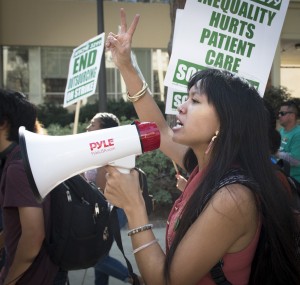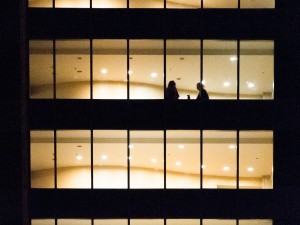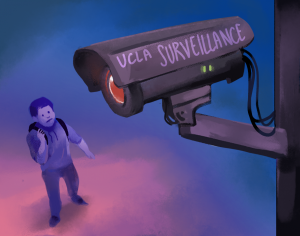This Week in the News serves as the Quad’s space for reflection on current events at and around UCLA. Every week, Daily Bruin staffers will analyze some of the most significant stories to keep readers up to speed.
Welcome to week four, where if you don’t have a test or essay to stress over, you will soon enough. This week saw the announcement of a new security camera policy on campus, uproar over changes to the structure of Residential Life management, a new robot food delivery service startup, a massive three-day strike by UC workers, and the release of 31 cases of sexual misconduct by the Title IX Office. Here are the Quad’s picks for the biggest stories for the week.
UCLA workers voice their concerns as AFSCME begins three-day strike

American Federation of County, State and Municipal Workers Local 3299, the UC’s largest employee union representing over 25,000 service workers and patient care technicians, went on strike from Tuesday to Thursday.
The strike follows a previous three-day strike held by AFSCME in May. That strike centered on gender-based and racial discrimination in hiring and wage practices. The strike this week was focused on outsourcing, job security, and stagnant wages at the UC.
During the strike, dining hall hours and menus on the Hill were limited, so UCLA Dining offered meal coupons in exchange for Hill swipes to students with meal plans. The meal coupons provided students the option to feed themselves without spending additional money ordering food in, going to Westwood Village to eat, or eating at underserviced dining halls.
Students joined in the protests to show solidarity with workers, many of whom work in dining halls or as custodians on the Hill.
It is unclear if the strikes will lead to additional bargaining with the UC. The UC previously offered AFSCME members a 3 percent raise but the union is seeking a 6 percent increase.
Students in ResLife share major concerns about unilateral revision of constitution

Administrators allegedly amended the Hill’s student government constitution over the summer without input from students.
Changes to the constitution effectively reduced student representation from roughly 10 elected and paid representatives per residential building to three. Three new hourly paid programming assistant positions will take the place of the seven eliminated representative positions. These programming positions will not be elected like the previous representatives, but rather appointed by Residential Life.
Multiple students involved in and employed by ResLife spoke out against the changes anonymously due to fear of possible repercussions taken by ResLife administrators against those who voice dissent. Together, the anonymous sources paint a picture of a culture of fear and toxic power dynamics perpetuated by ResLife professional administrators toward student representatives.
Administrators assure that security camera policy will promote student safety

UCLA announced a new security camera policy in September titled Policy 133. The policy gives UCPD access to the thousands of cameras already installed across campus without having to request access from individual departments.
Students voiced their concerns over the policy during a town hall held Oct. 10, and afterwards submitted a letter to administrators calling for more student input on the policy before it goes into effect.
The policy would not see any additional cameras installed across campus, but rather aims to centralize the system of cameras already in place. Policy 133 raises the question of whether additional UCPD access to cameras across campus will provide students with a safer, more secure environment, or if a potential abuse of power in monitoring and policing students could occur.
Title IX Office releases 31 cases of employees committing sexual misconduct
UCLA’s Title IX Office responded to a public records request Friday, releasing 31 cases of UCLA employees found in violation of University of California Policy for Sexual Harassment and Sexual Violence over the past two years.
The 31 cases included UCLA staff, faculty and employees found to have committed instances of sexual misconduct under a “more likely than not” standard of proof the Title IX office adheres to in their investigations.
Although many of the names of both claimants and respondents were redacted, one notable case is that of former history professor and director of the UCLA Center for Near Eastern Studies, Gabriel Piterberg. Claims against Piterberg alleging unwanted physical advances toward students were made as early as 2008. UCLA removed Piterberg from his position as director of the Center for Near Eastern Studies in 2015, barred him from meeting with students individually, and required Piterberg attend sexual harrasment training, but the Title IX Office did not conduct a formal investigation of Piterberg until 2017.
UCLA and Piterberg eventually reached a settlement in 2017 terminating Piterberg’s employment and denying him emeritus status. It is unclear exactly how many of the 31 respondents in the cases remain employed by UCLA.
Kiwi Bots roll into the Westwood area’s food delivery scene
A new food delivery service implementing robots as delivery devices began operating in Westwood this month.
Kiwi Campus is a startup that first started operating at UC Berkeley. With Kiwi’s expansion to Westwood, customers can download a mobile application to order food and drinks from about 15 partnered restaurants in the Westwood Village area to be delivered via robot for around a $4 fee. The Kiwi bots cannot currently deliver on campus, as the company is waiting for the city to approve its permits that would allow their robots to roam campus.
